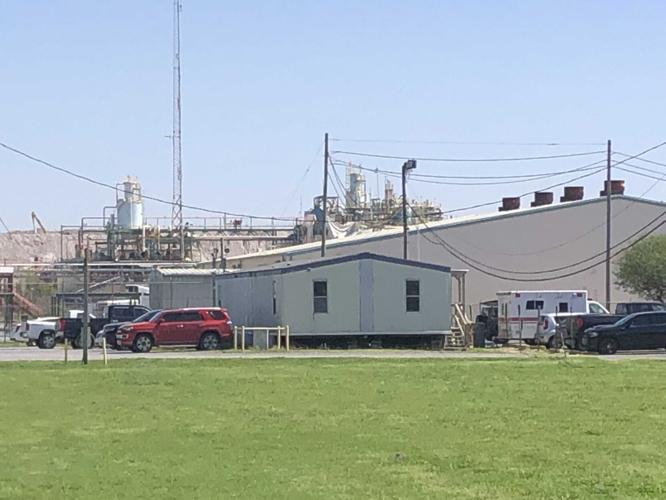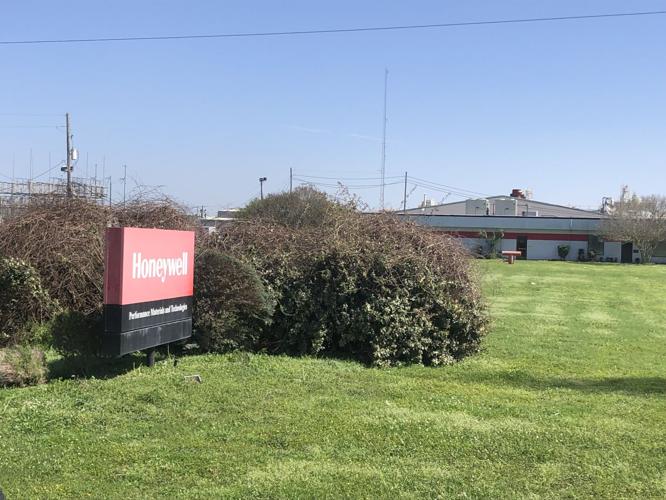A release of dangerous hydrofluoric acid seriously injured a worker at Honeywell International on Friday and has prompted the opening of the second investigation in two months by a federal industry watchdog looking at accidental releases of the chemical at the Ascension Parish plant.
The U.S. Chemical Safety and Hazard Investigation Board is sending a team to the complex in Geismar to probe the release of the "highly toxic" chemical used at the plant along the Mississippi River, an agency statement says.
The company reported that a contract employee was exposed on Friday to the chemical known as "HF" while doing maintenance, the board said in a statement Monday.
The worker, whom regulators identified as a Turner Industries Group employee, was sent to the hospital, the board said. A Honeywell spokeswoman said the contractor was later released from the hospital.
The chemical release did not result in off-site exposure for affected employees in neighboring plants or the wider public, state, local and company officials said on Monday and Tuesday.
"This is the third serious incident involving the release of HF at this facility in the last three years. This cannot keep happening," Steve Owens, chairman of the chemical safety board, said Monday.
The U.S. Occupational Safety and Health Administration also sent investigators to the plant and opened its own probe into the incident on Tuesday, one day after the chemical board announced its investigation and Turner Industries had reported the incident to OSHA's Baton Rouge office, an agency spokesman said.
In a statement Tuesday, Caitlin Leopold, Honeywell spokeswoman, said the incident was an isolated one "with no exposure to any other person or impact to the community."
"Our primary focus remains the safety and well-being of all personnel and the surrounding community, and we will fully cooperate with the U.S. Chemical Safety and Hazard Investigation Board’s investigation," she added.
Honeywell in Geismar makes hydrogen fluoride by using sulfuric acid to react with a mined rock known as fluorspar.
The company then sells the chemical to other companies and also uses it to manufacture refrigerants, solvents, blowing agents and other products.
Hydrogen fluoride also is a potent toxin that becomes hydrofluoric acid when mixed with water. Federal regulators say it burns and rapidly absorbs through the skin, causes organ damage and can be fatal in high enough concentrations.
The chemical board announced a similar inquiry in early April over a release of hydrofluoric acid vapor in January 2023 that, at 871 pounds, was, at the time, the largest among a string of mostly smaller HF releases over the past five years of Honeywell's operations.
Local authorities said an explosion or loud bang was reported sometime after 8 p.m. Jan. 23, 2023.
Precautionary highway closures were made on La. 30, La. 73, La. 3115 and River Road for about an hour. Honeywell employees and those at neighboring plants sheltered in place for a time.
No one was seriously injured in that 2023 release, the chemical safety board said, but "the release could have put workers at the facility and nearby residents at serious risk under different circumstances."
The January 2023 incident also involved the release of nearly 1,700 pounds of caustic chlorine into the air. The board's investigation into the 2023 incident at Honeywell is still underway.
Chlorine is a toxin that suffocates people at high enough levels.
In October 2021, Jason Derousselle, a Prairieville man who worked at the Geismar plant, died after being exposed to HF on unprotected areas of his face, ear, and neck. The safety board has said that a gasket in the piping at the facility catastrophically failed.
The latest incident on Friday did not prompt immediate disclosures from Honeywell on its website or local Facebook page.
A Honeywell spokeswoman provided a media statement on Tuesday after being contacted late Monday afternoon following the chemical board's disclosure.
The statement on Monday afternoon from the chemical safety board, which is based in Washington, D.C., appears to be the first public disclosure of the incident three days earlier in southeastern Louisiana.
In addition to Honeywell, local agencies that respond to and oversee public safety incidents in the parish's chemical sector also did not publicize the incident, including the Ascension Parish Sheriff's Office and the state Department of Environmental Quality.
A chemical board spokeswoman said her agency learned about it through its own incident reporting rules and, as local officials contacted Monday noted, the release appeared to "be localized to the facility."
Donovan Jackson, sheriff's spokesman, said on Monday that deputies in Ascension did not issue a statement because the release did not pose an "offsite/public threat."
Louisiana State Police, which serves as the incident commander for major hazardous incidents, was also notified and did respond to the incident and found it had "no offsite exposure," said Capt. Nick Manale, agency spokesman.
State Police officers typically are not the officials to issue initial public statements about ongoing chemical releases.
A DEQ spokeswoman said she was gathering information on Monday afternoon.
Appointed by the president and confirmed by the Senate, members of the chemical safety board don't issue citations or fines but make safety recommendations to companies, other groups and regulators after incidents occur.
The board often focuses on "process safety," an area of industrial operations that concerns the safe handling and processing of hazardous chemicals.
Editor's note: This story was updated about 11:40 p.m. Monday, June 10, 2024, and at 9:20 a.m. and 11:45 a.m. Tuesday, June 11, 2024, to include statements from State Police, the chemical safety board, Honeywell and the U.S. Occupational Safety and Health Administration.


